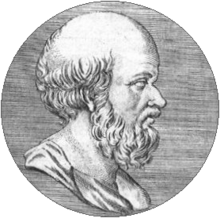This week it will be Nicolas Copernicus’s 600th birthday. Copernicus belongs to the club of superswots  known as polymaths which, like many membership organizations nowadays, is struggling.
known as polymaths which, like many membership organizations nowadays, is struggling.
The original polymath was Eratosthenes: pentathlete, librarian of Alexandria, philosopher and founder of Geography (amongst other accomplishments). He had, as our picture shows, an absolutely enormous brain. He was a contemporary of another polymath, Archimedes.
a contemporary of another polymath, Archimedes.
In the first millennium AD, the best all-rounders tended to come from the Arab world. We often hear that it was Muslim scholars who kept much of Greece’s accomplishments alive until the Scholastics rediscovered them; to a great extent this was thanks to Al-Kindi, who, though perhaps not much of an innovator, absorbed and re-presented an absolutely vast amount of information, effectively founded The House of Wisdom in Baghdad, and popularized the Indian system of numbering which is now used by everyone [which in time led to the widespread misunderstanding that they are Arabic numerals].
 Al-Kindi’s contemporaries at the House of Wisdom, the barnstorming Buna Musa brothers, Ahmad, Muhammad and Hasan, translated classical works from Greek, Latin and Chinese, took great strides in Geometry and produced the Book of Ingenious Devices, essentially a bunch of designs for really cool toys. Their father had been a highwayman who became a court astronomer, which was fine during the Islamic Golden Age.
Al-Kindi’s contemporaries at the House of Wisdom, the barnstorming Buna Musa brothers, Ahmad, Muhammad and Hasan, translated classical works from Greek, Latin and Chinese, took great strides in Geometry and produced the Book of Ingenious Devices, essentially a bunch of designs for really cool toys. Their father had been a highwayman who became a court astronomer, which was fine during the Islamic Golden Age.
With the beginning of the second millennium, the archipelago of Great Minds (or at least the ones we know about) arcs gracefully north-west, via Maimonides and Averroes, to revered churchmen (and at least one churchwoman) in Northern Europe: Albert the Great, Hildegard, Roger Bacon and then the brainy Pole Copernicus.
So what happened to the polymaths? I suppose the obvious answer is that with academic disciplines becoming a lot more advanced than they once were, you would go mad if you tried to excel in more than one field. There are fewer things left to discover; the game has changed.
Another might be that truly great minds can only flourish in truly great eras, and we don’t live in one of those. Depressing but there it is. The golden age of Islam ended centuries before Islamic culture actually realised it was going backward. Al-Kindi’s omnivorous reading was possible thanks to the enlightened Mutazillite philosophy which dominated in the early years. After its defeat by the anti-intellectual Asharites, the greatest Islamic learning was pushed to the fringes of the Empire and was to be found in Andalusia, and then, eventually, nowhere at all.
